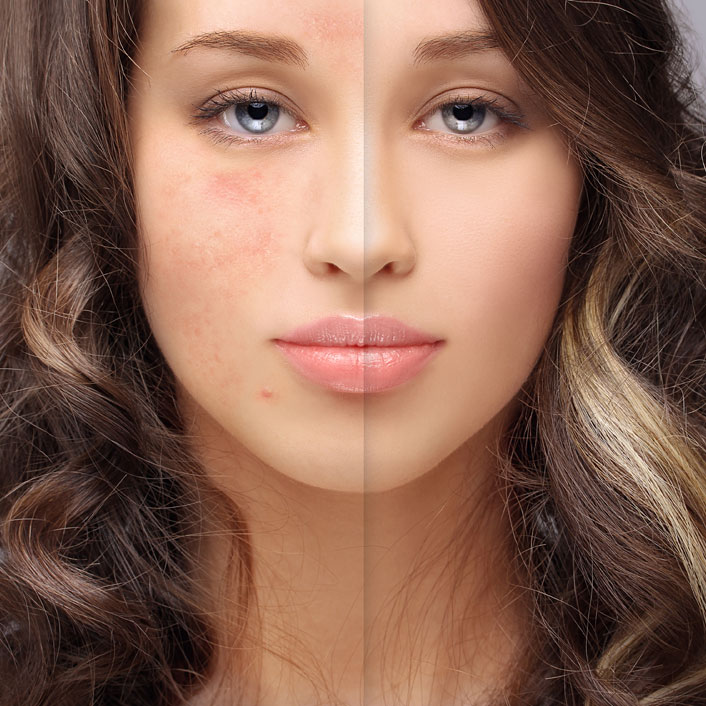The Compete Guide To Psoriasis Skincare
We developed this guide to psoriasis skincare because over 125 million people across the globe deal with psoriasis. If you’re one of the many who struggle with this skin condition, it’s important that you make the right choices with your skincare routine so you can enjoy less irritation and healthier skin.

What Causes Psoriasis?
As with other autoimmune conditions, psoriasis is caused by an overactive immune system that attacks healthy, normal tissues. In this case, skin cells grow at a faster rate in various locations on the body.
What are the Symptoms of Psoriasis?
For most people, the signs of psoriasis include:
- Dry, itchy skin
- Inflammation
- Thick, raised skin patches
- Flaky, peeling skin
- Pink, brown, red or silver scales
- Sores or lesions
The thick, dry patches, known as plaques, can sometimes ooze or bleed when the skin is broken. Usually, these symptoms appear on the:
- Knees
- Elbows
- Scalp
- Face
- Lower back
- Palms
- Soles of feet
People with severe cases may also experience psoriasis in their fingernails, toenails or mouth.
How Does Psoriasis Affect Your Health?
Those dealing with psoriatic issues usually experience consistent skin irritation. The right psoriasis skincare routine can make a big difference. This can be unsightly and may lead to self confidence issues. In addition, those with psoriasis may also be at risk for other health problems, including arthritis, diabetes, depression and cardiovascular issues.
How is Psoriasis Diagnosed?
Psoriasis is often mistaken for a bad case of eczema since many of the symptoms are similar. If you’re experiencing consistent skin irritation and inflammation, it’s best to see a doctor who can perform an evaluation and take samples as needed to give you an accurate diagnosis.
What are the Treatment Options for Psoriasis?
Currently, there is no cure for psoriasis but there are many treatments that help patients enjoy reduced symptoms, healthier skin and a better quality of life.
Practice Healthy Psoriasis Skincare
For most people suffering from psoriasis, maintaining a healthy skincare routine helps keep flareups at bay while achieving smoother, more comfortable skin. Choosing the right products and techniques while avoiding irritants can make a big difference.
Topical Medications – Mositurizer for Psoriasis
For those with mild to moderate symptoms, a topical medication may be recommended for daily use or spot treatment. Sometimes, using a moisturizer for psoriasis skin every day can help reduce the number of flareups, while a medicated ointment can be applied to plaques to promote healing and improve itching and swelling.
Oral Medications and Light Therapy
People with moderate to severe psoriasis may benefit from an oral medication to help balance the immune system from within. Others may see a reduction in symptoms when undergoing UV light therapy. Both require an evaluation by a physician and are usually reserved for those with extreme symptoms.

Cleansing
Wash your face twice a day: once in the morning and once before bed. You should also cleanse after a sweat-inducing workout. Avoid washcloths and use your fingertips to massage in a gentle cleanser that’s safe for sensitive skin, then rinse with lukewarm water and pat dry.
Exfoliating
Removing dead skin cells once or twice a week is critical for those with psoriasis but most mechanical exfoliants can lead to increased irritation and cuts in the skin. Instead, opt for a chemical exfoliant that breaks down dead skin cells without the need for scrubbing. Salicylic acid, glycolic acid and lactic acid can all be used to accomplish the task but be sure to start slow and monitor your skin’s reaction carefully.
Moisturizer For Psoriasis
You’ll want to invest in a high quality moisturizer for psoriasis to help keep dry, itchy, scaly skin in check. Use it faithfully after every cleansing session but be sure to follow your doctor’s recommendations for any topical medications as well. In addition, apply a psoriasis-friendly body lotion from the neck down every day, giving extra attention to problem areas.
Using Other Psoriasis Skincare Products
For most people with psoriasis, finding the right combination of skincare products is a journey of trial and error. In general, these morning and evening routines can work well as long as you use products that are safe, non-irritating and feel good on your skin.
Mornings
- Moisturizing cleanser
- Soothing toner
- Hypoallergenic eye cream
- Moisturizing or brightening serum
- Psoriasis-friendly moisturizer
- Sunscreen
- Cosmetic products
Evenings
- Makeup remover for sensitive skin
- Gentle, exfoliating toner or treatment (every two to three days as needed)
- Moisturizing cleanser
- Hypoallergenic eye cream
- Medications and ointments for psoriasis treatment
- Hydrating or anti-aging serums
- Psoriasis-friendly nighttime moisturizer
Facial and Body Hair Removal
Dealing with unwanted hair can be a challenge when you’re experiencing flareups. Shaving with psoriasis has its challenges but can be done with care. Use plenty of warm water and lather up with a shaving cream that’s formulated for sensitive skin. Shave in short gentle strokes in the direction of the hair growth, avoiding any plaques or open sores.
Never shave, dermaplane or wax over psoriasis plaques and avoid using tweezers in these areas; use scissors to trim the hair here instead. Chemical hair removers should never be used on skin with psoriasis. Talk with your dermatologist about which hair removal options are safe for your unique skin; you may need to use multiple techniques on different areas of your body.
Applying Cosmetics
When you wear makeup, you’ll want to opt for a lighter touch and add as few layers as possible. Steer clear of cream-based formulas and limit powders to eye shadows and blush. Finally, make sure you remove your makeup completely at the end of the day; you may want to avoid waterproof products since these can irritate your skin during removal.
Practicing Sun Protection
Excessive exposure to UV rays can make psoriasis worse. Use sunscreen on a daily basis and look for products that are:
- Broad spectrum
- Made with zinc oxide or titanium dioxide
- Water- and sweat-resistant
- A minimum SPF of 30
Apply sunscreen liberally at least 15 minutes before you head out into the sun and reapply every two hours if you’re staying outdoors. When possible, try to stay in the shade and wear lightweight clothing and hats to cover your skin.
Avoiding Irritants
Some ingredients can exacerbate psoriasis symptoms and lead to even more irritation and inflammation. When shopping for new products, make sure you check the labels so you can avoid some of the worst irritants.
Psoriasis Skincare Products
In general, you’ll want to look for products with some important key words, such as “sensitive skin”, “hypoallergenic” and “non-comedogenic”. These items are usually free from some of the most common irritants and are formulated to prevent them from settling deep into your pores. Some may also contain ingredients that are gentle and even soothing for your sensitive skin.
Stay away from topical products that contain:
- Alcohol
- Sulfates
- Fragrances
These additives can can irritate and dry out your skin even more and should be avoided completely.
Clothing and bed linens
Heavy or synthetic fabrics can be abrasive and can trap sweat and bacteria against your skin. Fleece, wool and tight-knit synthetics aren’t a good choice for your clothing, bed sheets and blankets. Shop for fabrics that are gentle on your skin and allow it to breathe, such as cotton or silk blends.
Detergents and Household Cleaners
When washing your clothes, buy detergents that are fragrance-free and have been approved by the National Psoriasis Foundation. Otherwise, your clothing can collect irritating ingredients that can transfer to your sensitive skin. Exposure to household cleaners can also harm your skin, so wear protective gloves when washing dishes and handling cleaning products.

Prep Your Skin Carefully
Makeup should always be applied to a clean face, so start with a hydrating cleanser to prepare your skin. Next, apply a facial moisturizer for psoriasis to help you achieve a more even application while hydrating your sensitive skin. Topical medications and ointments don’t mix well with makeup, so ask your doctor if these products can be applied at night before bed instead.
Choose Products With Better Coverage
When you’re dealing with plaques or flareups, you’ll need a product that offers good coverage. Investing in cosmetics that offer better coverage with fewer applications can be well worth it. Otherwise, you could end up caking on layers of makeup that can give you an unnatural appearance while clogging your pores.
Look for Nourishing Added Ingredients
Shop for products that are designed to help add moisture and sooth irritation. Just like your skincare products, your makeup products should also be formulated for sensitive skin. Natural moisturizers, nourishing vitamins and built-in sunscreens are helpful ingredients that can limit the number of products you need while still protecting and enhancing your skin.
Stick to a Liquid Foundation and Apply it First
Liquid cosmetics are best for achieving a smooth look on rough, uneven skin. Find a liquid foundation or tinted moisturizer that offers maximum coverage and apply it to your entire face first. Then, follow up with concealer as needed to hide trouble spots and ensure a better blend for a more natural look.
Opt for Blending Sponges Instead of Brushes
If you have psoriasis, bristle brushes can irritate your skin and push the product too deep into uneven patches. Also, they’re not conducive to achieving a smooth look on rough skin. Instead, use a blending sponge or your fingers to gently apply and blend your makeup products.
Avoid Open Cuts or Lesions
As tempting as it may be to disguise those scales and thick patches of dry, discolored skin, you should never apply makeup to open sores or cuts. This can lead to infection and often makes matters worse. Keep these areas clean and follow your healthcare provider’s instructions for treating painful, oozing or bleeding flareups.
Use Products With a Matte Finish
Products that provide a shimmery or glittery finish usually contain fine particles that can settle into your psoriasis plaques and make matters worse. As beautiful as it may be, it’s best to avoid this type of makeup and choose options that provide a matte finish instead. You can still achieve a glowing, highlighted look with matte products; book an appointment with a makeup artist to help you learn how to achieve the look you want with the products that are best for your skin’s needs.

Scalp and Hair
Use a psoriasis shampoo to clean your scalp and limit irritation should be a part of every good skincare routine. Massage gently but thoroughly with your fingertips to remove sebum and product buildup. Always follow up with a moisturizing conditioner to hydrate your hair and skin.
Nails
Keep your nails healthy by cleaning them, trimming them often and moisturizing your hands and feet on a regular basis. If you do develop psoriasis of the nails, talk to your doctor about treatment options and use them faithfully to combat symptoms.

- Fried foods
- Refined sugars and flours
- Shellfish
- High-sugar and high-fat foods
- Pork and red meat
- Dairy
Keep your skin and your body hydrated by drinking plenty of water. Use air humidifiers and purifiers to keep the air in your home clean and moist.
Even with psoriasis, you can enjoy comfortable, beautiful skin. Choose the right products and practices for the best results and always consult with your physician to protect your skin and prioritize your health.
7 Tips for Psoriasis in Summer
Does your psoriasis act up when temperatures soar in the summertime? Managing [Read More...]
Best Skincare Products For Psoriasis and How To Use Them
Psoriasis patients typically have symptoms that include thicker skin that has red [Read More...]



